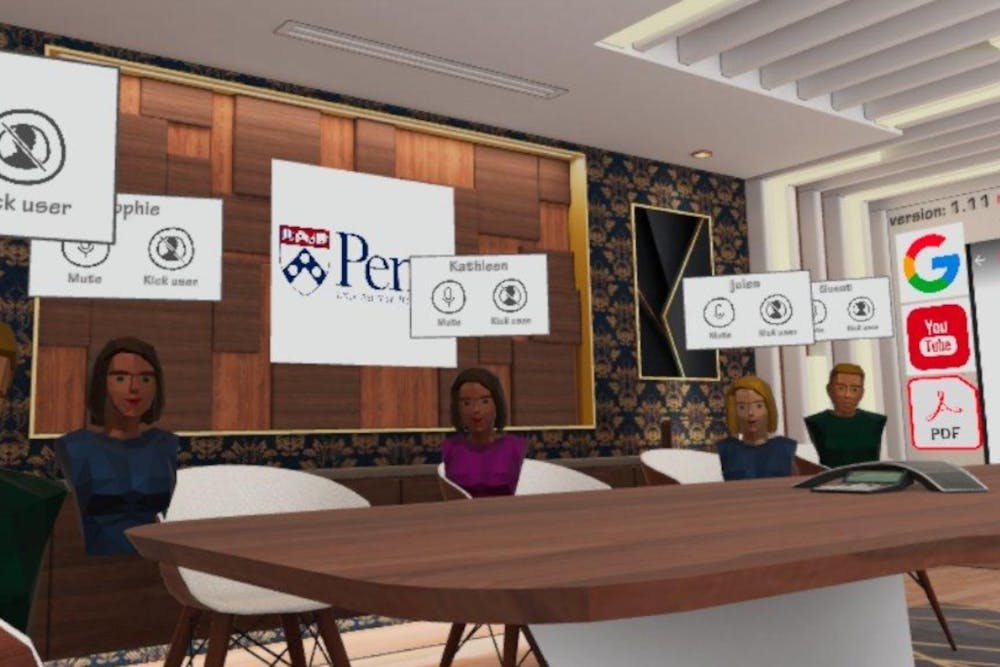
Students attending INTR 391: Senior Seminar for Thesis Research in the spring semester with Professor of International Relations Farah Jan used virtual reality headsets which allowed them to customize their avatars, walk around, and have face-to-face conversations with Jan and their classmates. (Photo from Farah Jan)
Professor of International Relations Farah Jan used virtual reality to teach INTR 391: Senior Seminar for Thesis Research in the spring 2021 semester.
Students attended the class using virtual reality headsets, which allowed them to customize their avatars, walk around, and have face-to-face conversations with Jan and their classmates. Students also had the ability to raise their hands and choose where to sit in the virtual reality classroom that Jan designed.
Although her proposal to teach using virtual reality was approved by the International Relations program, she did not receive funding from the program to provide the virtual reality headsets. Three of the headsets were provided by the Penn Libraries, and Jan provided the rest herself, she said. She mailed the headsets to students prior to the start of the spring semester to give students time to get accustomed to the virtual reality setting.
“For the first class, we walked around the seminar room that Professor Jan made, figured out controls, and had face-to-face conversations for the first time, which was pretty interesting,” 2021 College graduate Kathleen Curlee said.
Jan’s previous experience using virtual reality to create an application with her son piqued her interest in using virtual reality for teaching, she said, adding that she became even more interested when the COVID-19 pandemic caused classes to shift to a remote setting.
Jan worked with a team to develop PennVR, an app that she and her students used to log into the synchronous class sessions. Over the summer of 2020, however, Oculus — a company that creates virtual reality systems — released more advanced virtual reality headsets. The software of the app she was creating had to be updated to be compatible with the new headsets, she said.
“My initial plan was to start [using virtual reality for teaching] in fall 2020, but lo and behold Oculus came out with this completely new [virtual reality] headset,” Jan said. “It really was a game changer, so we switched platforms and started working on updating the app to be ready for the Oculus Quest 2 version.”
2021 College and Wharton graduate Beau Staso said he appreciated using virtual reality because it gave him a break from looking at a computer screen and using Zoom.
“It was nice to put on a headset and feel like I was somewhere else,” Staso said. “You could see hand gestures, too. We received hand controllers, so we could see Professor Jan pointing at the board, and others raising their hands.”
Like Staso, Curlee said that attending class using virtual reality made her feel like she was with her classmates in person, adding that she found herself thinking about her physical appearance because she felt like her classmates could actually see her instead of her avatar.
Jan noted that students were more engaged in her class than while attending classes on Zoom. Messages and alerts on students’ computers can be distracting while on Zoom, she said, adding that students are not able to respond to messages while in the virtual reality classroom.
“When you go to respond to messages, your avatar drops, and to me that’s a signal that a student is no longer in the classroom and no longer focused,” she said.
2021 College graduate Julianna Emanuel praised Jan for ensuring that the virtual reality classroom ran smoothly.
“[Professor] Jan was absolutely incredible — spending nights, weekends, afternoons troubleshooting with her students,” she said. “She was really invested in making sure her students got the fullest experience possible.”
Jan said she hopes the University will continue offering classes in virtual reality and advancing virtual reality technology, noting that students in her class were unable to take notes in the virtual reality classroom, which she hopes will be possible in future virtual reality classrooms.
"We are, I’m pretty sure, most likely one of the only [universities] that have done an international relations or a social sciences class in [virtual reality]," Jan said. “I think [Penn] should be the leaders of [virtual reality]. We should not be following someone else’s path in integrating [virtual reality] into online education.”
The Daily Pennsylvanian is an independent, student-run newspaper. Please consider making a donation to support the coverage that shapes the University. Your generosity ensures a future of strong journalism at Penn.
Donate



